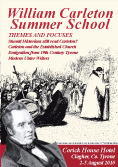"Come away! O, human child! To the woods and waters wild. With a Fairy hand in hand, for the world is more full of weeping than you can understand". from "The Stolen Child" by William Butler Yeats
March 23 to March 29
Fairy and Folk Tales of the Irish Peasants
Much of the history and culture of Ireland can be learned from reading the extensive oeuvre of William Carleton. There is no better place to explore this than in the William Carleton Summer School of the William Carleton Society of given every August since 1992 by the William Carleton Society. Here is the description of the school from their very informative web page
The annual William Carleton Summer School, one of Ireland’s most significant literary festivals, has since 1992 celebrated the life and writings of the novelist William Carleton, 1794-1869. The School is held from the first Monday in August until the Friday of the same week in Carleton’s own district, the Clogher Valley in Co Tyrone. In addition to the main programme of lectures and debates, the School offers bus tours of places that have Carleton associations, in neighbouring counties. The tours are led by well known local historians and Carleton scholars, and evening entertainments include drama performances, traditional and classical music and storytelling.
I hope to be there in August 2013.
Please consider joining us for Irish Short Story Week Year Two, March 12 to April 11 (yes long week). All you need do is post on one short story by an Irish author and send me a comment or an email and I will include it in the master post at the end of the challenge.
I hope you will join us. All you have to do if you want to participate is to do a post on a Short Story by an Irish author and either leave me a comment with a link to it or send me the post data by e mail. I will announce the posts and will also do, as I did last year, a master post spotlighting the participating blogs. Last year posts were done by book bloggers from all over the world on a total of sixty short stories.
 |
| "Oh Rory, I guess as there will be a story about you this week":-Carmilla |
I will be keeping my posts short this week as all of the stories in the collection are short?
"Frank Martin and the Fairies" deals with an interesting question. What did most people really think of people who completely believed in Fairies and their worlds, people who saw Fairies and talked to them on a regular basis? What forces might drive someone to think he was surrounded by fairies only he could see?
A belief in Fairies was not a cute diversion or a source of fun to everyone, many believed this world was very real. It would be easy to explain it as pure escapism brought on by the history of Ireland in a times when there were no medical treatments mandated for those who saw themselves as living among invisible to all but them characters. Walk into a modern emergency room and tell them you are being accompanied by a troop of twenty invisible fairies, talk and argue with them as if they are very real and see what happens.
Frank Martin was "as sensible, sober and rational as any other man; but on the subject of Fairies the man's mania was particularly strong and immovable. Indeed, I remember that the expression of his eyes was singularly wild and hollow, and his long narrow temples sallow and emaciated".
 |
| "Leprechauns are NOT fairies, keep you remarks to yourself, Carmilla"-Rory |
Frank had a wonderful relationship with the fairies. He would conduct long conversations with them, laughing hilariously at times, they even slept in his bed with him. When people would come into his weaving shop they would ask him how the fairies were and he would say, "There are a dozen in the shop now". People just accepted this and did not seem to see him as crazy at all. Now Fairies if you make them mad can be dangerous but when Frank was baptized the priest gave him a special baptism that protected him from Fairies. (Irish Fairies were not like Tinker Bell, often stole children and adult. They also put curses on those who disrespected them.)
This is a very well done story that lets us see from the inside what it might have been like to live in Ireland in the 19th century and be a strong believer in Fairies.
Mel u







No comments:
Post a Comment